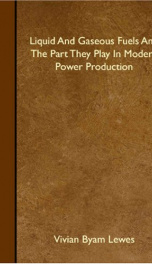liquid and gaseous fuels and the part they play in modern power production

LIQUID AND GASEOUS FUELS - INTRODUCTION - THE subject of Liquid and Gaseous Fuels has, during the last decade, assumed such importance that no apology is necessary for the present attempt to treat the subject from a popular but comprehensive point of view. The development of the internal combustion motor, the coming of the automobile, and the important part played by liquid fuel in the Navies of the world, make the present time one of the most interesting epochs in the history of power production, and it is hoped that by bringing together the history and practical development of the use of various forms of combustible liquids and gases for the generation of energy this boolr may do some service in the advancement of the subject. Although the book is only supposed to treat of fuel in its liquid and gaseous form, it is so absolutely impossible to divorce these from the subject of solid fuel, which is in most cases the parent from which the others have sprung, that in order to retain the necessary sequence in treatment solid fuel has also been considered, in some cases, as with peat, at considerable length. There is not the slightest desire or intention in the authors mind to produce a book which shall in any way take the place with the . student of such works of reference as Sir Boverton Redwoods Petroleum and its Products, Mr. E. Dowsons Producer Gas, or Mr. Booths Liquid Fuel, but rather to give a general sketch of the whole subject and its bearings on the power problems of the day, and to leave the student to refer to sucll standard worlts as may be necessary for the detail of various applications. In order to facilitate the study of any special branch of the subject a short bibliography is added, which it is hoped will prove of use for reference, and in which are included many works to which the author. owes a debt of gratitude. The first three chapters of the work deal with the phenomena of combustion and the part played by the atmosphere, the formation of fuel in its various forms, and the methods by which we determine its value as a source of heat energy. In the next following chapters will be found an account of the production, properties, and use of the Iiquid fuels and their adoption as an auxiliary to coal in European Navies, whilst the subject of coal gas and the factors which have made it one of the most important of domestic fuels will also be found treated at considerable length. Water gas, both as a help to the coal gas malrer and the engineer, receives due attention, whilst those gases which, although the poorest in thermal value, have proved themselves the most valuable in cheapening power production, are fully treated with in the section dealing with poor fuel gases and the suction plant. The last chapter deals with the future of the fuel problem and the probable lines on which a world,. banlrrupt in fuel, will find means of regenerating the energy which is essential to life and prosperity, and it is hoped that the short disc ssion on the value of alcohol as a fuel in the vii internal cornbustioi motor may lend to an increase in the esl erimentalu - orlr in this direction. Some of the nlatter utilised ill prepnriirg this book has nl peared before iii lectures and papers given hefore various Itlstitutiolis by the author, but rrllere such 11 s been used, it hias 1 een brought up to date, and the author desires to express his indebtedlless to those who have assisted lliill with l hotogrnplls of plant nnd lnaterial for clingrams. TABLE OF CONTENTS. CHAPTER I...
Info about the book
Author:
Series:
Unknown
ISBN:
9992501405
Rating:
5/5 (3)Your rating:
0/5
Languge:
English
Users who have this book
Users who want this book
What readers are saying
What do you think? Write your own comment on this book!
write a commentGenre
if you like liquid and gaseous fuels and the part they play in modern power production try:
Other books by this author
Do you want to read a book that interests you? It’s EASY!
Create an account and send a request for reading to other users on the Webpage of the book!


